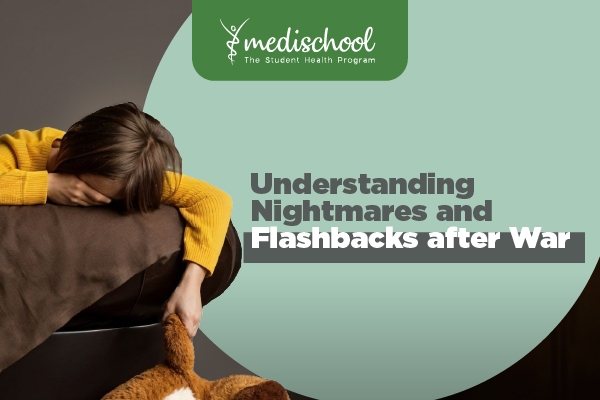
Understanding Flashbacks and Nightmares After War
Flashbacks and nightmares are common responses to trauma, especially after experiencing the intense stress of war. For children, these episodes can be particularly distressing, as they may not fully understand why they are happening. Flashbacks can make past events feel real again, while nightmares disrupt sleep and create fear of going to bed.
To help children overcome these challenges, parents can start by creating a safe and reassuring environment. Remind children that what they are feeling is a natural reaction to their experiences and that they are now in a safe place. Encourage them to talk about their feelings, but avoid pressuring them to share more than they are comfortable with.
Practical strategies include establishing a calming bedtime routine, such as reading a soothing story or practicing deep breathing exercises together. If a flashback occurs, guide your child to focus on the present moment by using grounding techniques like identifying objects around the room or holding a comforting item.
It’s important for parents to stay patient and calm, as children often take cues from their caregivers. Seeking professional support from a therapist experienced in trauma can provide additional tools and coping strategies. Group therapy or support groups can also help children feel less isolated, as they connect with others who have similar experiences.
By addressing these challenges with understanding, love, and professional guidance, children can gradually learn to cope with flashbacks and nightmares, reclaiming their sense of security and peace.
إن استرجاعات الذاكرة والكوابيس هي ردود فعل شائعة للصدمة، خاصة بعد التعرض لضغوط شديدة مثل الحروب. بالنسبة للأطفال، قد تكون هذه التجارب مرهقة للغاية، حيث يصعب عليهم فهم سبب حدوثها. يمكن أن تجعل الاسترجاعات أحداث الماضي تبدو وكأنها تحدث من جديد، بينما تتسبب الكوابيس في اضطراب النوم وتزيد من الخوف من الذهاب إلى الفراش.
لمساعدة الأطفال على مواجهة هذه التحديات، يمكن للآباء البدء بتوفير بيئة آمنة ومطمئنة. يجب طمأنة الأطفال بأن ما يشعرون به هو استجابة طبيعية لما مروا به، وأنهم الآن في مكان آمن. شجعهم على التحدث عن مشاعرهم دون الضغط عليهم لمشاركة أكثر مما يرغبون.
تشمل الاستراتيجيات العملية إنشاء روتين مهدئ قبل النوم، مثل قراءة قصة مريحة أو ممارسة تمارين التنفس العميق معًا. إذا حدثت استرجاعات للذاكرة، يمكن توجيه الطفل للتركيز على الحاضر باستخدام تقنيات مثل التعرف على الأشياء من حوله أو حمل شيء يبعث على الراحة.
من المهم أن يتحلى الآباء بالصبر والهدوء، حيث يأخذ الأطفال الإشارات من مقدمي الرعاية لهم. قد يكون الحصول على دعم متخصص من معالج نفسي متمرس في مجال الصدمات أداة فعالة لتوفير استراتيجيات للتكيف.
من خلال التعامل مع هذه التحديات بفهم وحب ودعم مهني، يمكن للأطفال تعلم التكيف مع استرجاعات الذاكرة والكوابيس، واستعادة إحساسهم بالأمان والسلام.




